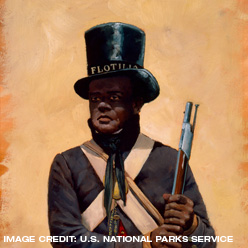
Diversity in the War of 1812
At the outbreak of the War of 1812, slavery was still legal in the United States and African Americans were not seen as free individuals. The British were offering freedom and British citizenship for African Americans who fought on their side, but many chose to fight alongside other Americans against the European invaders. Although African Americans were not allowed to be conscripted soldiers, the Americans were desperate for able bodies to fight in the conflict.
William Williams
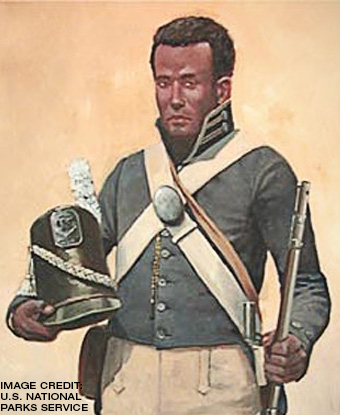 William Williams was born into slavery on a plantation in Prince George's County, Maryland. In 1814, he escaped and joined the 38th U.S. Infantry where he was paid a $50 bounty and secured an $8 per month salary and the promise of 160 acres once the war had ended. On September 10, 1814, Williams traveled with his unit to For McHenry and arrived two days before the British started a bombardment campaign where they fired over 1,500 explosive shells at the 38th Infantry. He survived this bombardment and on October 25, 1814, he reported himself to the 10th District General Military Hospital in Baltimore after feeling ill. Here he was diagnosed with tuberculosis and was treated by Dr. Tobias Watkins, Regimental Surgeon of the 38th U.S. Infantry. William Williams died on March 19, 1815 while still an enlisted soldier for the United States.
William Williams was born into slavery on a plantation in Prince George's County, Maryland. In 1814, he escaped and joined the 38th U.S. Infantry where he was paid a $50 bounty and secured an $8 per month salary and the promise of 160 acres once the war had ended. On September 10, 1814, Williams traveled with his unit to For McHenry and arrived two days before the British started a bombardment campaign where they fired over 1,500 explosive shells at the 38th Infantry. He survived this bombardment and on October 25, 1814, he reported himself to the 10th District General Military Hospital in Baltimore after feeling ill. Here he was diagnosed with tuberculosis and was treated by Dr. Tobias Watkins, Regimental Surgeon of the 38th U.S. Infantry. William Williams died on March 19, 1815 while still an enlisted soldier for the United States.
Jordan B. Noble
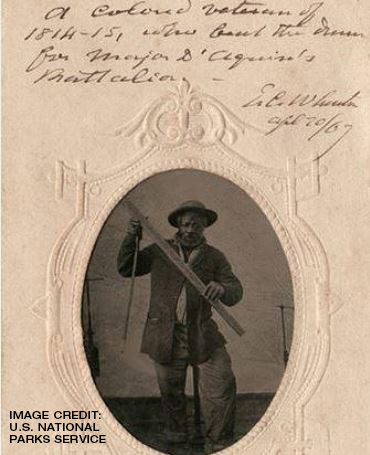 Although he was born into slavery in 1800, Jordan B. Noble would go on to become a revered war hero. On June 2, 1814, he and his mother were sold to Lieutenant John Noble of the 7th Regiment, who was under the command of Major General Andrew Jackson. Noble would serve as the drummer for this regiment and was one of nearly 900 other enslaved people and free men of color volunteers that
Although he was born into slavery in 1800, Jordan B. Noble would go on to become a revered war hero. On June 2, 1814, he and his mother were sold to Lieutenant John Noble of the 7th Regiment, who was under the command of Major General Andrew Jackson. Noble would serve as the drummer for this regiment and was one of nearly 900 other enslaved people and free men of color volunteers that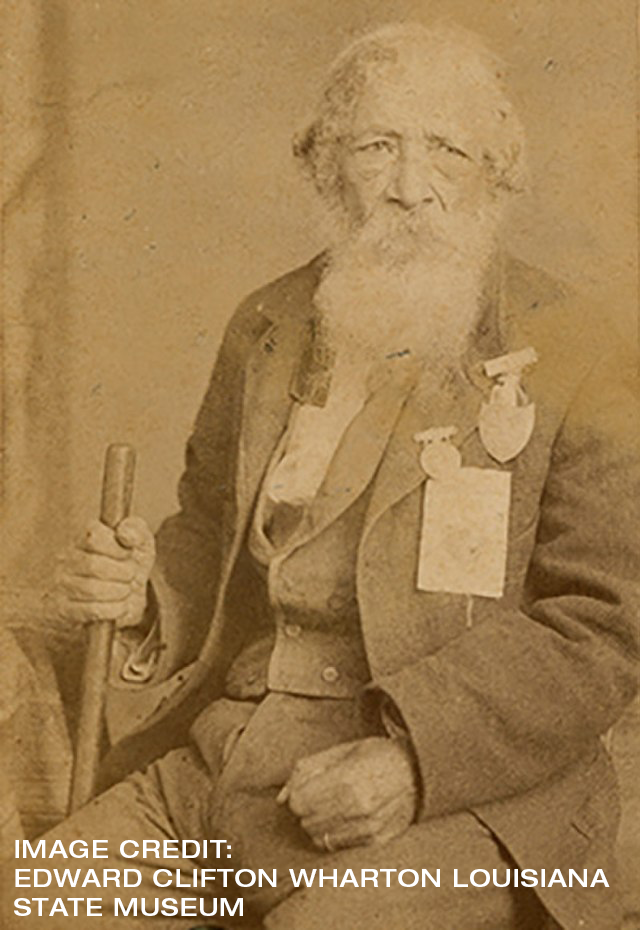 helped defend against the British invasion. He was present for the Battle of New Orleans on January 8, 1815 where "the rattle of [Noble's] drum was heard [even] amidst the bin of battle...in the hottest of hellfire." They were successful in repelling the British advance and helped secure their retreat from the Gulf Coast. Noble eventually gained his freedom and continued his military service in the 1836 Seminole War in Florida, the Mexican-American War, and the American Civil War. Once Noble's fighting days were over, he was revered among the free black community of New Orleans through his military legacy as "The Drummer Boy of the Battle of New Orleans."
helped defend against the British invasion. He was present for the Battle of New Orleans on January 8, 1815 where "the rattle of [Noble's] drum was heard [even] amidst the bin of battle...in the hottest of hellfire." They were successful in repelling the British advance and helped secure their retreat from the Gulf Coast. Noble eventually gained his freedom and continued his military service in the 1836 Seminole War in Florida, the Mexican-American War, and the American Civil War. Once Noble's fighting days were over, he was revered among the free black community of New Orleans through his military legacy as "The Drummer Boy of the Battle of New Orleans."
Charles Ball
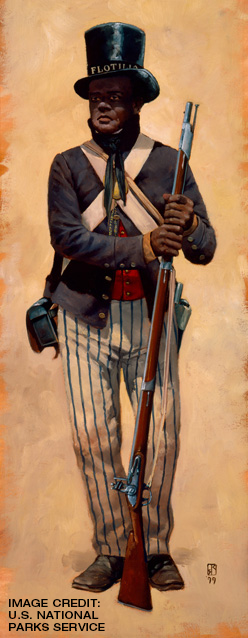 Born into slavery in 1781, Charles Ball was sold to various owners until 1800 where his master hired him out to the Navy. He was stationed as a cook aboard the USS Congress for about two years before he was sold again and taken to South Carolina. After seven years, Ball escaped to Maryland so he could be closer to his family. He declared himself a free man and worked at small farms around the Chesapeake until the breakout of the War of 1812 where he enlisted under Commodore Joshua Barney.
Born into slavery in 1781, Charles Ball was sold to various owners until 1800 where his master hired him out to the Navy. He was stationed as a cook aboard the USS Congress for about two years before he was sold again and taken to South Carolina. After seven years, Ball escaped to Maryland so he could be closer to his family. He declared himself a free man and worked at small farms around the Chesapeake until the breakout of the War of 1812 where he enlisted under Commodore Joshua Barney.